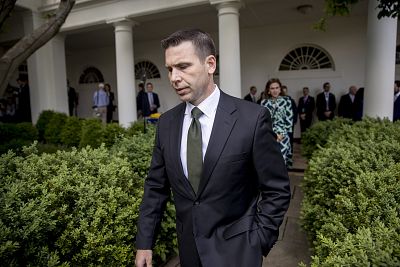As many as 1,000 undocumented immigrants a month would be brought to Palm Beach and Broward Counties, local leaders were told.
Florida officials are demanding answers about a Department of Homeland Security plan to send 1,000 "unlawful immigrants and asylum-seekers" a month to two heavily Democratic counties — and so far they're not getting any.
Gov. Ron DeSantis, a Republican and a close ally of President Donald Trump, called the plan "not acceptable," and said it might not be enacted.
"I'm going to be addressing this," he told reporters on Friday.
"Nothing's concrete," DeSantis said. "This is not something that came down from the White House. This was something that came out of the agencies."
In a letter to acting DHS boss Kevin McAleenan on Thursday, Sen. Marco Rubio, R-Fla., said he was told about the plan "to transport approximately 500 migrants per month from El Paso, Texas, to both Broward and Palm Beach Counties for release pending an asylum hearing" from local law-enforcement.
"Does the Department intend to transport migrants currently in custody at the southern border to states that do not share a border with Mexico?" Rubio asked, referring to the entrants as "unlawful immigrants and asylum-seekers." "If so, why?"
Palm Beach County Sheriff Ric Bradshaw said they were informed of the basics of the plan this week by border patrol operations in Miami, but have not been able to get any specifics.
"The composition, according to what we were told, were supposed to be family units. We don't know what that means. We don't know if that means a 15 year old, a mother and a father, or a 5 year old and a mother, or just a father and a child," he told reporters.
"What kind of health conditions do they have?" Bradshaw asked. "What are they going do when they get here?"
He said there appears to be no plan in place by the feds for what happens to the migrants after they're processed at immigration facilities. He said CBP plans "to give them a notice to appear to come to a hearing at some later date, and then release them into the community. No accommodations for transportation leaving there, no accommodations for shelter or a place to live, just no real plan on what's going to happen to these 500 people."
He said charitable resources in the area are already stretched thin. "We have a homeless problem, we're dealing with a Hepatitis A outbreak, we're dealing with measles outbreaks," Bradshaw said.
Broward County Mayor Mark Bogen said, "We will do everything possible to help these people," but added, "this is irresponsible policy. To bring hundreds of people here every week without providing the necessary resources to house and feed them is inhumane."
"If the president will not provide us with financial assistance to house and feed these people, he will be creating a homeless encampment," Bogen said.
Rep. Ted Deutsch, D-Fla., said Congress has been kept in the dark.
"There's a stunning amount of confusion surrounding the Administration's outrageous immigration policy, even more today than usual," he said. "I hesitate saying more about these reports because no one in the Administration seems to know what is happening."
The CBP office in Miami referred all inquiries on the matter to the DHS in Washington. DHS has not responded to requests for comment.
While Florida voted for Trump in 2016, the two counties that would be impacted by the plan are Democratic strongholds.
Last month, the president said he was "giving very strong consideration" to a plan to bus detained immigrants to so-called sanctuary cities as a way of retaliating against Democrats for blocking his efforts to change the country's "very dangerous immigration laws."
"We'll bring them to sanctuary city areas and let that particular area take care of it," Trump told reporters at the White House. "They say we have open arms, they're always saying they have open arms, let's see if they have open arms."
Trump made the statement after it was reported that DHS had considered such a plan but rejected because it was "so illegal."
Neither Broward nor Palm Beach counties are "sanctuary" areas that limit cooperation with immigration authorities.
The governor said a large influx of asylum-seekers in any part of the state would put a strain on state and local services.
"This I would think would cause a lot of stress on our communities," DeSantis said. "We have a lot of fish to fry with our own state and our own citizens."
Rep. Frederica Wilson, D-Fla., an outspoken Trump critic, said in a statement, "Voters won't like this attempt to manufacture crises in our communities and drain already strained resources, nor will they forget it when they head to the polls next year. Building encampments on the grounds of his beloved Mar-a-Largo, however, is something they likely can get behind."












